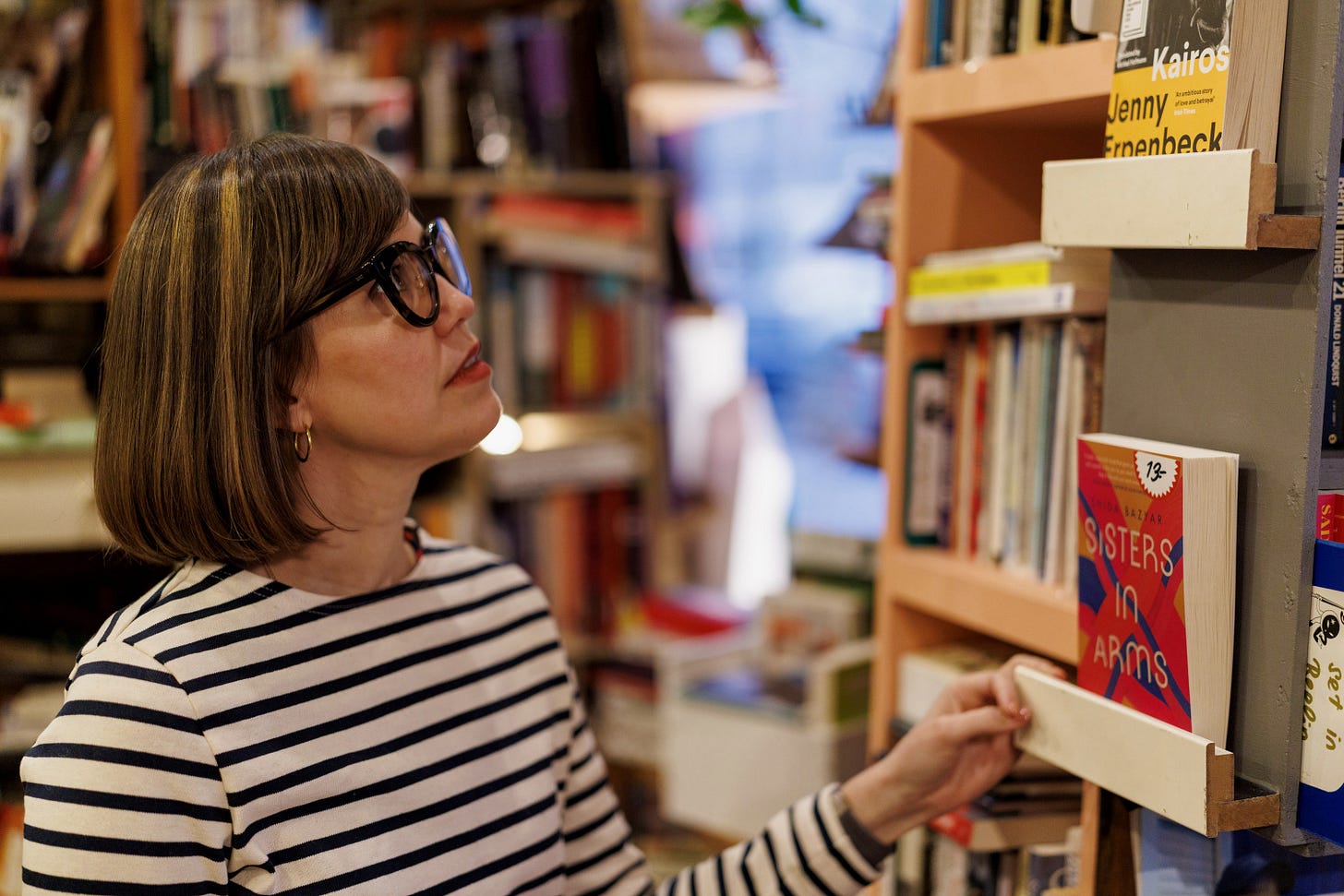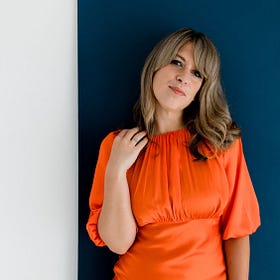What does our reading tell us?
The secrets revealed by what we're reading (or aren't)
When my reading shifts, I notice.
Just as physical symptoms can function like clues, alerting us to changes in our physical health, I’ve always found my reading to be the best indicator of my mental state.
Last October, in the days before my TEDx talk in London, I rehearsed the talk in my mind in every open moment. Whenever I went to the loo, I ran it in front of the mirror, in my head in bed when I tried —and failed— to fall sleep. When I woke up in the middle of the night, I’d run through the bullet points of every topic I wanted to cover. Then I’d repeat the body of the talk itself.
There were so many words running through my mind that final week, that reading fell away. On the morning after the event, I crawled down the stairs to my friend’s living room. She took one look at me and sent me back to bed. Once I was up there, I tried picking up a book, but my eyes refused to focus, like I was trying to read through a fog. I felt formless, but the lack of form felt heavy, the opposite of weightless.
The absence of reading was like the ground had fallen away.
It was several weeks before I could do anything but reread comfort favorites, despite wanting the delight of a new story. I simply couldn’t engage. It reminded me of Katherine May writing in Enchantment about her change in reading habits during the pandemic:
“Lately I can’t read a whole page of a book. It is frictionless, this sliding of attention. I thought it would resolve once the lockdowns ended, but it did not.”
Reading habits by the numbers
According to a study conducted by the Pew Research Center1, the ‘average’ American reads twelve books a year. Given that people who read a lot more skew this average, analysis concludes the number could be as low as four books.2 Conducted in 2016, this study is now nearly a decade old, and while book sales and reading numbers increased during the pandemic, reading isn’t growing by leaps a bounds. People who read a lot still read a lot, and those who don’t haven’t become voracious readers overnight. In 2021, Pew research determined that nearly a quarter of Americans hadn’t read a single book in the previous year.3
As a US-born German resident, I’m much more in the mix with multiple nationalities than I was back in the States. Germany is very pro-reading, with bookstores open as essential services during all of the pandemic and lockdowns. When we first arrived in Berlin in 2018, it was as common to see a commuter reading a physical book on the Ubahn as it was to see them staring at phone.
January through March of this year, my reading consumption was high, even by my standards. I went to bed early and read for hours each night. Each month, I read up to 30% more pages than I had the month before. And then we hit April.
But for much of April, I’ve had the eyes blurring feeling, like my pupils were dilated for a vision test. I was still reading, but it felt like I had my foot on the accelerator and the brakes at the same time. In March, I finished an 800-page book in a few days, while in April, I spent nearly a week on a book barely cracking 250.
I have the odd feeling of imminent burnout lately, but I can’t point to what is overloading me exactly. Perhaps it’s multiple writing projects, life admin that feels particularly intense now (applying for German citizenship is an exercise in paperwork mastery I have never before reached), or maybe it’s just Weltschmerz, a favorite German word meaning pain caused by the state of the world. Literally world pain.
In times like this, I turn to books, but sometimes cannot receive their wisdom.
What happens to us when we can’t receive creative nourishment?
When I’m coming down with an illness, I know it the first morning because the thought of coffee repulses me. If I don’t want a steaming mug any morning, there is something wrong. I’ve come to see reading the same way, but the diagnosis is quite a bit trickier.
Rather than having a cold, I often feel cynical, exhausted, or a bit like I did after the talk: like too many words and ideas have tunneled through my synapses, and the passages need to regenerate to transmit sparks of insight and joy again.
Not reading isn’t an option for me, as falling asleep is Pavlovian for this insomniac. If I read for an hour, then I can sleep. Otherwise, no such luck. Thankfully, turning to old favorites is restorative, as I also discussed in this podcast episode:
Read Yourself Happy with Daisy Buchanan
*This podcast is made possible by the generous support of Book Alchemy’s paid membership. To support the show, please consider upgrading your subscription.
While I can only speak for myself, I’ve begun wondering if the decline in reading around the world relates to singed synapses everywhere. Reading is often the activity that transmits stress and fear, in the form of news, demands from employers, or bills pouring in.
How can we preserve the written form as the conduit writers wish to use it for: the transmission of ideas, emotion, and insight?
This past week, my reading resistance has eased. I felt absorbed in a book and blew through it in a couple days. My breath loosened, and the world seemed to right itself. Reading less is a question of identity for me, being a serious reader, but it’s also the ability to take in nourishment. Just like football is life for Danny Rojas, reading is life for most writers, at whatever speed and quantity they prefer.
As always, Rebecca Solnit says it even better, in The Faraway Nearby:
“We feed on sorrows, on stories, on the spaciousness they open up when they let us travel in our imagination beyond our limits, when they dissolve the boundaries that confine us and urge us to extend the potentialities of our imperfect, broken, incomplete selves.”
How do we maintain a relationship to reading that allows for this expansion. This is what I crave, even when reading fumbles. Especially then.
I don’t have answers to this question, but I’m curious about your observations.
Book Alchemy members: let’s dive in!
What have you discovered about your reading habits and how they reflect your mental health?
Do you always read the same amount, or does it shift with seasons or other cycles?
What about genre, or new books versus rereading?
Save the date:
This Friday, 25 April, I’m running our monthly member’s live.
Bring your questions for an ask me anything, plus get the behind the scenes for some big changes coming for the Secret Library Podcast.
Want to join the live, get the replay, AND get access to multiple workshops?
Upgrade your membership here:
https://www.pewresearch.org/internet/2016/09/01/book-reading-2016/
https://bookriot.com/how-many-books-does-the-average-person-read/
https://www.pewresearch.org/short-reads/2021/09/21/who-doesnt-read-books-in-america/






Same here, Caroline, with the feeling of imminent burnout. Sometimes I have to force myself to sit and read (setting a timer for the minimum reading time if necessary). There are plenty of studies on how our digital life reduces our attention span, and I do feel that in myself.
I used to read fast and mostly monogamously. Now I seem to graze on several books, not until my currently-reading list gets overwhelming (it’s pretty close right now).
As of now, I’m reading two books of essays(ish) that don’t need to be read sequentially: a writing craft book (Jami Attenberg’s 1000 Words) , and the Best American Essays 2024 collection, and another
NF book I’ve only read the intro of but don’t want it to slip off the radar,
an entertaining NF audiobook I had to return to the library before I finished and have just now borrowed again (Come as You Are).
A novel that I’m enjoying sitting in a comfy chair and relaxing my body as I read it (Andrew Miller’s the Slowworm’s Song), and I haven’t started the book club novel borrowed from the library I should read by early May.
And of course, sometimes I slip a beloved book off the shelf to read a bit for solace.
I used to read voraciously, but since I had covid in late 2021 my reading has dried to a trickle. Part of it is I had switched to reading almost entirely by ebook and I had come to the conclusion that that has worn on my eyes and changed my brain. Part of it is Covid harmed my vision in some way - I had to get a stronger eyeglass prescription almost immediately. And then there is this internal anxiety I have never shaken off since everything Covid related. I miss reading and really struggle to sit down and ease into the pleasure of it.